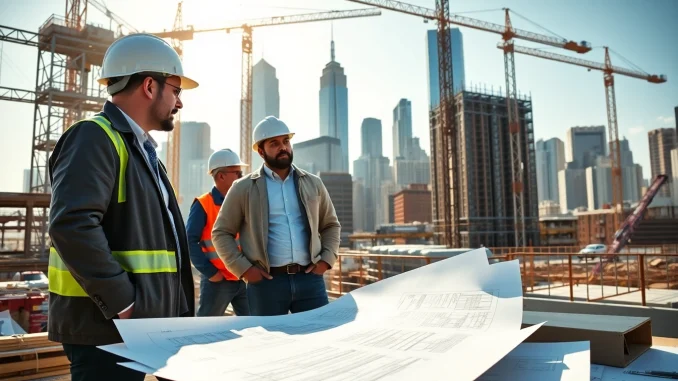
Understanding the Role of a New York City General Contractor
Defining Responsibilities and Duties
The role of a general contractor in New York City is multifaceted, serving as the pivotal coordinator on construction projects. General contractors are responsible for managing all aspects of a building project, including planning, execution, and completion. This includes securing necessary permits, sourcing materials, hiring subcontractors, and overseeing day-to-day operations on the job site. Their duties extend beyond management; they must ensure job site safety, adhere to building codes, and maintain communication with clients to keep them informed about project progress.
Key Skills and Qualifications
To effectively fulfill these responsibilities, general contractors must possess a unique blend of technical skills and soft skills. Key qualifications often include:
- Technical Expertise: A thorough understanding of construction methods and materials is essential.
- Project Management: The ability to manage time, resources, and workforce efficiently.
- Financial Acumen: Skills in budgeting, cost estimation, and financial forecasting are crucial.
- Negotiation Skills: Contractors often negotiate contracts and settle disputes with suppliers and subcontractors.
- Communication Skills: Clear communication is vital for collaborating with clients, architects, and tradespeople.
The Importance of Licenses and Insurance
In New York City, all general contractors must have proper licensing and insurance. The licensing process ensures that contractors meet necessary standards of quality and safety. Additionally, insurance protects both the contractor and the client from unforeseen issues, such as accidents or property damage. Hiring an adequately licensed and insuredNew York City General Contractor is not just a regulatory necessity; it provides peace of mind that qualified professionals are managing your project.
How to Find the Right New York City General Contractor
Researching Credentials and Experience
Finding the right general contractor begins with thorough research. Evaluate potential candidates by checking their credentials, such as licenses and certifications, and inquire about their experience in projects similar to yours. Many reputable contractors will showcase their previous work—both completed projects and ongoing ones—via websites or portfolios. This step can significantly influence your choice, as experienced contractors are more likely to navigate challenges efficiently.
Reading Reviews and Client Testimonials
Another critical step in the evaluation process is to read reviews and client testimonials. Many platforms allow past clients to share their experiences, which can provide valuable insights into the contractor’s performance, reliability, and quality of work. Look out for contractors with consistent positive feedback regarding their communication skills, adherence to deadlines, and overall workmanship.
Asking for Recommendations
Networking can also play a pivotal role in your search for the right contractor. Ask friends, family, or colleagues for recommendations based on their past experiences. A personal referral can often lead to a reliable contractor who has already proven their capabilities. Additionally, local building suppliers and architects may also have insights into trustworthy contractors.
Evaluating Proposals from New York City General Contractors
Understanding Cost Estimates
Upon receiving proposals from potential contractors, it’s essential to evaluate the cost estimates comprehensively. A good estimate should detail labor, materials, and any additional costs that may arise. Don’t simply choose the lowest bid; consider what is included in the estimate and the quality of materials proposed. A contractor who provides a transparent breakdown is more trustworthy.
Analyzing Work Timelines
A clear and reasonable timeline for project completion should accompany each proposal. Look for contractors who provide a detailed schedule that outlines key milestones and deadlines. Delays can lead to increased costs and disrupt your project, so it’s essential to select a contractor who demonstrates a track record of timely project completion.
Comparing Services Offered
While evaluating contractors, don’t just focus on pricing and timelines. Consider the range of services offered in their proposals. Some contractors may provide comprehensive project management services, including design and planning, while others may focus solely on construction. Aligning the contractor’s offerings with your specific project needs is vital for successful execution.
Best Practices for Communicating with Your New York City General Contractor
Setting Expectations from the Start
Successful communication begins with setting clear expectations at the beginning of the project. Discuss your goals, budget, and desired outcomes openly with your contractor. Make it clear what your priorities are to avoid misunderstandings later on. This honest dialogue establishes a foundation of trust and understanding.
Establishing a Communication Plan
Alongside expectations, create a communication plan that outlines how often and in what format you expect updates. Whether weekly meetings, daily check-ins, or email updates, having a structured plan helps keep both parties accountable and ensures everyone stays in the loop.
Addressing Issues and Changes Promptly
Construction projects often face unforeseen issues or require changes to initial plans. It’s crucial to address such matters promptly and openly with your contractor. Developing a collaborative problem-solving approach can significantly enhance the project’s success and help maintain the working relationship, reducing the tension that changes can sometimes create.
Measuring Success Post-Project Completion
Evaluating Project Outcomes and Quality
Once your project reaches completion, take time to evaluate the final outcomes and quality of work. Ensure that everything aligns with the agreed-upon specifications and that you are satisfied with the overall aesthetics and functionality. A thorough walkthrough with your contractor can help identify any potential areas requiring attention and solidify your understanding of the project’s success.
Gathering Feedback from Team Members
Feedback doesn’t stop at the contractor; it’s also important to gather insights from others involved in the project. Collaborators, such as architects or designers, can provide valuable perspectives on the process and the final results. This collective input can identify strengths and areas for improvement, aiding in the smooth execution of future projects.
Planning Future Projects with Your Contractor
If you are satisfied with your contractor’s work, consider establishing a long-term relationship for future projects. A strong rapport can facilitate smoother processes in subsequent projects, as your contractor will already be familiar with your preferences and standards. Plus, ongoing partnerships can sometimes lead to more favorable pricing or priority service.
Leave a Reply